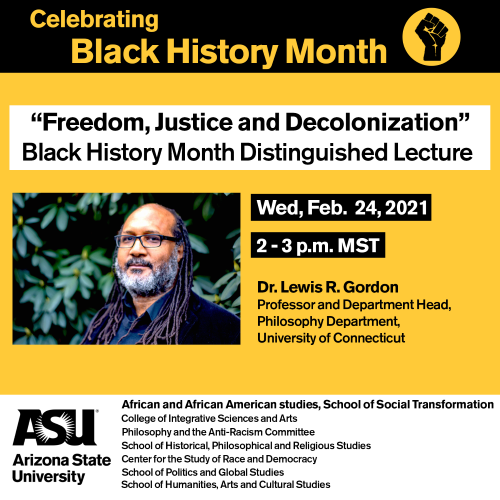Black History Month Distinguished Lecture: Lewis Gordon, Freedom, Justice and Decolonization

Please join us for Black History Month's Distinguished Speaker, Dr. Lewis Gordon, Professor and Department Head, Philosophy Department, University of Connecticut.
Wednesday, February 24, 2021, 2 to 3 p.m.
Register in advance for this zoom. http://links.asu.edu/BHM-LewisGordon
You can also watch this on YouTube https://youtu.be/Z3aGZqCEENY
Black History Month Distinguished Lecture (Lewis Gordon Lecture, Freedom, Justice, and Decolonization)
Lewis R. Gordon is Professor and Head of the Department of Philosophy at the University of Connecticut at Storrs; Honorary President of the Global Center for Advanced Studies; Honorary Professor in the Unit for the Humanities at Rhodes University, South Africa; Chairperson of the American Philosophical Association Committee on Public Philosophy; and Chairperson of the Awards Committee and Global Collaborations for the Caribbean Philosophical Association, of which he was the organization’s first president. His books published by Routledge include Fanon and the Crisis of European Man, Existence in Black, Existentia Africana, Disciplinary Decadence, and, with Jane Anna Gordon, Not Only the Master’s Tools and Of Divine Warning. Book description: The eminent scholar Lewis R. Gordon offers a probing meditation on freedom, justice, and decolonization. What is there to be understood and done when it is evident that the search for justice, which dominates the social and political philosophy of the North, is an insufficient approach for the achievements of dignity, freedom, liberation, and revolution? Gordon takes the reader on a journey as he interrogates a trail from colonized philosophy to re-imagining liberation and revolution to critical challenges raised by Afropessimism, theodicy, and looming catastrophe. He offers not forecast and foreclosure but instead an urgent call for dignifying and urgent acts of political commitment. Such movements take the form of examining what philosophy means in Africana philosophy, liberation in decolonial thought, and the decolonization of justice and normative life. Gordon issues a critique of the obstacles to cultivating emancipatory politics, challenging reductionist forms of thought that proffer harm and suffering as conditions of political appearance and the valorization of nonhuman beings. He asserts instead emancipatory considerations for occluded forms of life and the irreplaceability of existence in the face of catastrophe and ruin, and he concludes, through a discussion with the Circassian philosopher and decolonial theorist, Madina Tlostanova, with the project of shifting the geography of reason.
This event is sponsored by:
School of Social Transformation;
Philosophy and the Anti-Racism Committee,
School of Historical, Philosophical and Religious Studies;
College of Integrative Sciences and Arts;
Center for the Study of Race and Democracy;
School of Politics and Global Studies;
School of Humanities, Arts and Cultural Studies